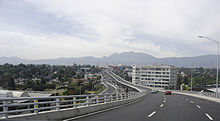Anillo Periférico



The Anillo Periférico known by locals as el periférico (Spanish for peripheral ring) is the outer beltway of Mexico City.
The Periferico was originally planned by architect Carlos Contreras as early as 1925, together with other major roads such as the Viaducto Miguel Alemán. Some parts of the beltway were built to follow the bed of a river; the flow of the river was modified to flow through a pipe.[1]
The beltway gained major media attention when the then Mexico City mayor, Andrés Manuel López Obrador, started a project to turn a southern section of the ring into a two-story highway. The second level was finished in 2006 in the Federal District and in the State of Mexico in 2009. From Cuautitlán in the north (State of Mexico) to Naucalpan at the Federal District border the second floor operates as the Viaducto Elevado Bicentenario ("Bicentennial Elevated Viaduct").[2] From the old bullring (Toreo) at the north of the Federal District to San Jerónimo in the southwest the second level is called the Autopista Urbana Norte ("Northern Urban Tollway").[3][4] At San Jerónimo the second level intersects directly with a toll road to Santa Fe, the Supervía Poniente. From San Jerónimo to the intersection with the Calzada de Tlalpan in the south of the city, the second level is called the Autopista Urbana Sur ("Southern Urban Tollway").[5]
References
[edit]- ^ Jorge Legorreta. "Viaducto y Periférico, creaciones urbanísticas de Carlos Contreras". La Jornada, 16 October 2002.
- ^ "Las 7 carreteras más importantes del sexenio de Peña Nieto". El Universal – Estado de México. Archived from the original on 13 July 2016. Retrieved 10 February 2017.
- ^ "Archived copy". Archived from the original on 2013-09-27. Retrieved 2013-09-22.
{{cite web}}: CS1 maint: archived copy as title (link) - ^ "SOBSE - Secretaría de Obras y Servicios". Archived from the original on 11 February 2017. Retrieved 10 February 2017.
- ^ "Archived copy". Archived from the original on 2013-09-28. Retrieved 2013-09-22.
{{cite web}}: CS1 maint: archived copy as title (link)


 French
French Deutsch
Deutsch